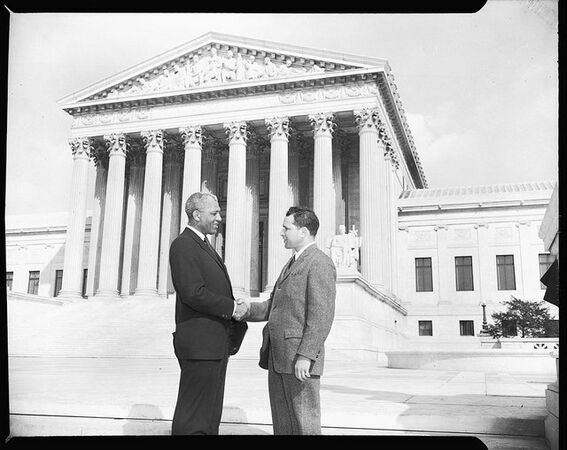Stokeling v. United States
 | |
| Stokeling v. United States | |
| Term: 2018 | |
| Important Dates | |
| Argument: October 9, 2018 Decided: January 15, 2019 | |
| Outcome | |
| Affirmed | |
| Vote | |
| 5-4 | |
| Majority | |
| Clarence Thomas • Stephen Breyer • Samuel Alito • Neil Gorsuch • Brett Kavanaugh | |
| Dissenting | |
| Sonia Sotomayor • Chief Justice John G. Roberts • Ruth Bader Ginsburg • Elena Kagan | |
Stokeling v. United States is a case that was argued before the Supreme Court of the United States on October 9, 2018, during the court's 2018-2019 term. The court affirmed the ruling of the United States Court of Appeals for the 11th Circuit, holding that the Armed Career Criminal Act's (ACCA) "elements clause encompasses a robbery offense that requires the defendant to overcome the victim’s resistance." The case came on a writ of certiorari to the Eleventh Circuit.[1][2]
You can review the lower court's opinion here.[5]
Timeline
The following timeline details key events in this case:
- January 15, 2019: U.S. Supreme Court affirmed the Eleventh Circuit Court's ruling
- October 9, 2018: Oral argument
- April 2, 2018: U.S. Supreme Court agreed to hear case
- August 4, 2017: Petition filed with U.S. Supreme Court
- April 6, 2017: Eleventh Circuit vacated Stokeling’s sentence and remanded for resentencing
Background
Denard Stokeling pleaded guilty in 2016 to charges that he was a felon in possession of a firearm. He had previously been convicted twice for robbery. Because of these convictions, Stokeling was eligible for sentencing under the Armed Career Criminal Act (ACCA), which imposes longer sentences on felons who are in possession of a firearm and who also have at least three prior violent felonies or high-level drug offenses. In Florida, where Stokeling was convicted, “state law includes overcoming ‘victim resistance’ as an element of robbery, but state courts have interpreted the offense as requiring only slight force to overcome such resistance,” according to SCOTUSblog.[6]
Stokeling argued that his prior convictions should not qualify as violent felonies under the ACCA because he did not use violent force. The United States Court of Appeals for the 11th Circuit vacated Stokeling's sentence and remanded for resentencing.[3]
Question presented
The petitioner presented the following question to the court:[4]
Question presented:
|
Audio
- Audio of oral argument:[7]
Transcript
- Read the oral argument transcript here.
Outcome
Justice Clarence Thomas delivered the opinion of the court. The court affirmed the judgment of the Eleventh Circuit, holding that the Armed Career Criminal Act's (ACCA) "elements clause encompasses a robbery offense that requires the defendant to overcome the victim’s resistance."[2]
Opinion
In his opinion, Justice Thomas wrote,
| “ | 'Physical force,' or 'force capable of causing physical pain or injury,' Johnson, 559 U. S., at 140, includes the amount of force necessary to overcome a victim’s resistance. Robbery under Florida law corresponds to that level of force and therefore qualifies as a 'violent felony' under ACCA’s elements clause. For these reasons, we affirm the judgment of the Eleventh Circuit.[8] | ” |
Dissenting opinion
Justice Sotomayor filed a dissenting opinion, in which Chief Justice Roberts and Justices Ginsburg and Kagan joined. In her dissent, Justice Sotomayor wrote,
| “ | Florida law applies the label 'robbery' to crimes that are, at most, a half-notch above garden-variety pickpocketing or shoplifting. The
Court today does no service to Congress’ purposes or our own precedent in deeming such crimes to be 'violent felonies'—and thus predicates for a 15-year mandatoryminimum sentence in federal prison. I respectfully dissent.[8] |
” |
Text of the opinion
- Read the full opinion here.
See also
External links
- U.S. Supreme Court docket file - United States v. Stokeling (petitions, motions, briefs, opinions, and attorneys)
- SCOTUSblog case file for United States v. Stokeling
Footnotes
- ↑ Supreme Court of the United States, "U.S. v. Stokeling," accessed September 24, 2018
- ↑ 2.0 2.1 2.2 2.3 U.S. Supreme Court, "Stokeling v. United States" Opinion, January 15, 2019
- ↑ 3.0 3.1 Oyez, "Stokeling v. United States," accessed September 25, 2018
- ↑ 4.0 4.1 Supreme Court of the United States, "17-5554 Stokeling v. United States," accessed September 24, 2018
- ↑ SCOTUSblog, "U.S. v. Stokeling," accessed September 24, 2018
- ↑ SCOTUSblog, "Justices grant one new case, summarily reverse in excessive-force case," April 2, 2018
- ↑ Supreme Court of the United States, Stokeling v. United States, argued October 9, 2018
- ↑ 8.0 8.1 Note: This text is quoted verbatim from the original source. Any inconsistencies are attributable to the original source.
| |||||||||||












